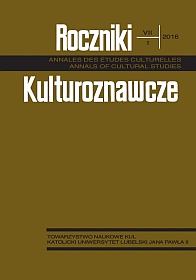A New Respublica Litteraria? Digital Humanities as the Metaorientation for the Contemporary Humanities
Abstract
In the article, I refer to the the issue of the digital turn in humanities, concerning its implications from the methodological perspective. I deal with the question: should digital humanities be defined only as the application of digital research methods in the field of humanities and the potential mode of its institutionalisation? Or may it be considered as a proposal for the improvement and introduction of the new republic of humanists, creating the research area for the projects situated between constructing / inventing and finding the solution?
References
A Companion to Digital Humanities. Red. Susan Schreibman, Ray Siemens, John Unsworth. Oxford:Blackwell 2004. http://www.digitalhumanities.org/companion/
A Companion to Digital Literary Studies. Red. Susan Schreibman, Ray Siemens. Malden, MA: Blackwell 2008. http://www.digitalhumanities.org/companionDLS/
Afeltowicz Łukasz: Modele, artefakty, kolektywy. Praktyka badawcza w perspektywie współczesnych studiów nad nauką. Toruń: Wydawnictwo Naukowe UMK 2012.
Bartscherer Thomas, Coover Roderick: Thinking through Digital Technology in the Humanities and the Arts. Chicago: University of Chicago Press 2011.
Between Humanities and the Digital. Red. Patrik Svensson and David Theo Goldberg. Cambridge: The MIT Press 2015.
Bomba Radosław: Narzędzia cyfrowe jako wyznacznik nowego paradygmatu badań humanistycznych. W: Zwrot cyfrowy w humanistyce. Internet / nowe media / kultura 2.0. Red. Andrzej Radomski, Radosław Bomba. Lublin: E-naukowiec 2013.
Burdick Anne, Drucker Johanna, Lunenfeld Peter, Presner Todd, Schnapp Jeffrey. Digital_ Humanities. Cambridge: MIT Press 2012.
Calasso Roberto. Zaślubiny Kadmosa z Harmonią. Przeł. Stanisław Kasprzysiak. Warszawa: Czuły Barbarzyńca Press 1988.
Carter Bryan. Digital Humanities: Current Perspective, Practices, and Research. Bingley, U.K.: Emerald 2013.
Debates in Digital Humanities. Red. Matthew K. Gold. University of Minnesota Press, Min-neapolis – London 2012. http://dhdebates.gc.cuny.edu/
Defining Digital Humanities: A Reader. Red. Melissa M. Terras, Julianne Nyhan, Edward Vanhoutte. Farnham, Surrey, England: Ashgate Publishing 2013.
Digital Humanities in Practice. Red. Claire Warwick, Melissa Terras And Julianne Nyhan. Facet Publishing 2012.
Eco Umberto: Po drugiej stronie lustra i inne eseje. Przeł. Joanna Wajs. Warszawa: Wydawnictwo W.A.B 2012.
Emerging Disciplines: Shaping New Fields of Scholarly Inquiry in and Beyond the Humanities. Red. Melissa Bailar. Houston: Rice University Press 2010.
Fiut Ignacy S., Habryń Marcin: Społeczność akademicka wobec możliwości wykorzystania Internetu w procesie pracy. W: Mikrospołeczność informacyjna na przykładzie miasteczka internetowego Akademii Górniczo-Hutniczej w Krakowie. Kraków: AGH 2001 s. 162. http://winntbg.bg.agh.edu.pl/skrypty/0020/roz6.pdf
Gardiner Eileen, Musto Ronald G.: The Digital Humanities. A Primer for Students and Scholars, Cambridge University Press 2015.
Heise Ursula K.: Zwrot postludzki. Nowa narracja o gatunkach we współczesnej literaturze amerykańskiej. W: Teoria – literatura – życie. Praktykowanie teorii w humanistyce współczesnej. Red. Anna Legeżyńska, Ryszard Nycz. Warszawa: IBL PAN 2012.
Jones Steven E.: The Emergence of the Digital Humanities. New York: Routledge 2014.
Kil Aleksandra: Nowe Media jako nasi wspólnicy. O sprawczości technologii na podstawie myśli Bruno Latoura. „Teksty Drugie” 2012 nr 6.
Leavy Patricia: Method Meets Art. Arts-Based Research Practice. New York, London: The Guilford Press 2009.
Leroi Armand Marie: One Republic of Learning. Digitizing the Humanities. „New York Times”, Feb. 2015. http://www.nytimes.com/2015/02/14/opinion/digitizing-the-humanities.html?_r=0.
Levy Pierre: Drugi potop. W: Nowe media w komunikacji społecznej XX wieku. Antologia. Red. Maryla Hopfinger. Warszawa: Oficyna Naukowa 2002.
Manovich Lev: Język nowych mediów. Przeł. Piotr Cypryański. Warszawa: Wydawnictwo Akademickie i Profesjonalne 2006.
Maryl Maciej: Nowa (?) filologia. „Teksty Drugie” 2: 2014. http://tekstydrugie.pl/pl/news/item/id,63,title,2014-nr-2-Nowa-filologia.html
McGann Jerome: A New Republic of Letters: Memory and Scholarship in the Age of Digital Reproduction. Cambridge: Harvard University Press 2014.
Nacher Anna: Poza cyfrowość w zwrocie cyfrowym – od humanistyki cyfrowej do spekulatywnej komputacji. W: Zwrot cyfrowy w humanistyce. Internet / nowe media / kultura 2.0. Red. Andrzej Radomski, Radosław Bomba. Lublin: E-naukowiec 2013.
Nelson Victoria: Sekretne życie lalek. Przeł. Anna Kowalcze-Pawlik. Kraków: UNIVERSITAS 2009.
Pisarski Mariusz: Xanadu. Hipertekstowe przemiany prozy. Kraków: Korporacja Ha!Art 2013.
Platon: Fajdros. Przeł. Leopold Regner. Warszawa: PWN 1993.
Pomian Krzysztof: Przeszłość jako przedmiot wiedzy. Warszawa: Fundacja Aletheia 1992.
Postman Neil: Technopol. Triumf techniki nad kulturą. Przeł. Anna Tanalska-Dulęba. Warszawa: Warszawskie Wydawnictwo Literackie MUZA SA 1995.
Radomski Andrzej: Digital Storytelling. Kilka słów o wizualizacji wiedzy w humanistyce. W: Zwrot cyfrowy w humanistyce. Internet / nowe media / kultura 2.0. Red. Andrzej Radomski, Radosław Bomba.Lublin: E-naukowiec 2013.
Steadman Ian: Big data and the death of the theorist. „Wired”. http://www.wired.co.uk/news/archive/2013-01/25/big-data-end-of-theory
Sterczewski Piotr: Czytanie Gry. O proceduralnej retoryce jako metodzie analizy ideologicznej gier komputerowych. „Teksty drugie” 2012 nr 6 s. 210-228.
The Johns Hopkins Guide to Digital Media. Red. Marie-Laure Ryan, Lori Emerson, Benjamin J. Robertson. Baltimore: Johns Hopkins UP 2014.
Understanding Digital Humanities. Red. David M. Berry. New York: Palgrave Macmillan, 2012.
Venturini Tommaso: Building on Faults: How to Represent Controversies with Digital Methods. „Public Understanding of Science” 2012. http://www.medialab.sciences-po.fr/publications/Venturini-Building_on_Faults.pdf. DOI: 10.1177/0963662510387558.
Wolek-Kocur Barbara: Człowiek między mediami. O ponowoczesnych doświadczeniach intermedialności. W: Konteksty intermedialności. Red. Maria Popczyk, Katowice: Wyższa Szkoła Zarządzania Ochrony Pracy w Katowicach 2013.
Wróbel Szymon: Lektury retroaktywne. Rodowody współczesnej myśli filozoficznej. Kraków: Universitas 2014.





